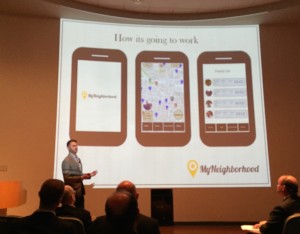Here are some big social impact ideas from Temple’s Be Your Own Boss Bowl
 April 27, 2016
Category: Featured, Medium, Results
April 27, 2016
Category: Featured, Medium, Results
Disclosures
Editor's note: BYOBB judge Christopher Wink is Generocity's editorial director. That relationship is unrelated to this article. An earlier version of this article incorrectly spelled Tyler Stoltzfus's last name. It has been corrected. Updated 5/3/16@ 11:15 a.m.Last weekend saw an organic dye company snag $20,000, a hyperlocal crowdfunding platform take home $10,000 and a biodegradable packaging material company and financial literacy app each grab $5,000.
Oh, and every company is run by students.
The Be Your Own Boss Bowl (BYOBB) was at it again.
Fox School of Business’s business plan competition awards almost $150,000 to undergraduate and graduate students and alumni annually. Here were this year’s four finalists in the social impact track:
- First prize, $20,000: Green Matters Apparel Company — Makes t-shirts from local plant materials
- Second prize, $10,000: MyNeighborhood — A hyperlocal crowdfunding platform
- Third prize, $5,000: Mycelioam, LLC — Makes biodegradable packaging material
- Fourth prize, $5,000: CoinFlip Inc. — A financial literacy app
BYOBB has kickstarted some big projects in the past, including last year, when Yasmine Mustafa’s ROAR for Good, LLC came in first place in the social impact track. (There are also those who argue it’s not such a great launchpad for entrepreneurship because of its focus on business plan development, not proof of concept.)
Green Matters cofounders Tyler Stoltzfus, a senior entrepreneurship major, and Winona Quigley, a senior at Parsons School of Design in New York, started the company to combat the world’s “water pollution epidemic,” Stoltzfus said.
Synthetic dye chemicals linked to cancer are being dumped in local waters. In response, Green Matters uses local plant materials for dye instead of synthetic dye to make its t-shirts. Plus, excess water from the dyemaking process can be used as a natural fertilizer in Green Matters’ greenhouse or sold to other greenhouses in the local community.
At BYOBB, Green Matters also received an invitation to present its plan to Investors’ Circle Philadelphia. Sid Amster, a member of Investors’ Circle and BYOBB judge, said the company would be strengthened by positioning itself as an organic dye company, rather than an organic t-shirt company, of which there are already many.
“The issue is developing organic dyes in sufficient volume — scalability — to allow the general public to have access to clothing that does not have an impact on the environment as much as whatever we’re wearing today,” he said.
“We have to figure out who wants this, who cares about natural dyeing,” Stoltzfus said about the potential shift in focus.
The cofounders will continue working on the company post-grad and plan to make t-shirts through the summer. Green Matters’ face time with Investors’ Circle means “this thing that we’ve been talking about for so long is looking more real than ever, which is very exciting for us,” Stoltzfus said.
Runner-up company MyNeighborhood cofounders Tony Meyer, a junior entrepreneurship major, and Alex Falcone, a senior advertising major, both have mothers who are schoolteachers and have seen them struggle to pay for things like classroom supplies and special project materials. Those experiences inspired the students to focus their company on enabling people to donate to fundraising campaigns within their own communities.
“We wanted to find a way to give back, but [we’re also] business-minded people who want to make a business that’s profitable,” Meyer said. “We want to help as many people as possible, and we think crowdfunding’s a way to do it that hasn’t been brought to the super-local level like we’re trying.”
The cofounders plan to participate in an accelerator this summer while building out their app and beta testing it in Media, Pennsylvania. True to the company’s values, they’ll conduct grassroots marketing — tabling at events such as farmers’ markets and local festivals — “just try to grow and grow and get as many users, schools, churches, community centers on our platform,” Meyer said.
Their product would have “definitely” moved forward whether they won the competition or not, he said. Participating in BYOBB helped it move along, though. The money won will go toward app development, legal fees and marketing.
“This is something that we’ve been sitting on for a long time, and BYOBB was a really good chance to start building for real and actually developing our business model and making it into something tangible and digestible for people,” Meyer said.
The merits of for-profit companies having social goals should be celebrated, according to Stoltzfus.
“Business is about finding a problem and solving it, and I feel like that is one of the keys to economic development,” he said. “The thing that makes this [business idea] exciting is that people actually care about it. They’re willing to pay and make conscious consumer decisions to help solve this problem.”
Social enterprise “is just a win-win for everybody,” he went on. “A catalyst for amazing change.”
Trending News










